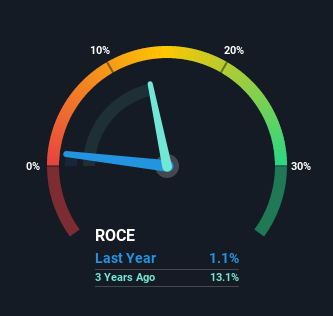- India
- /
- Paper and Forestry Products
- /
- NSEI:KUANTUM
Kuantum Papers (NSE:KUANTUM) Might Be Having Difficulty Using Its Capital Effectively
To find a multi-bagger stock, what are the underlying trends we should look for in a business? Typically, we'll want to notice a trend of growing return on capital employed (ROCE) and alongside that, an expanding base of capital employed. This shows us that it's a compounding machine, able to continually reinvest its earnings back into the business and generate higher returns. Having said that, from a first glance at Kuantum Papers (NSE:KUANTUM) we aren't jumping out of our chairs at how returns are trending, but let's have a deeper look.
Return On Capital Employed (ROCE): What is it?
If you haven't worked with ROCE before, it measures the 'return' (pre-tax profit) a company generates from capital employed in its business. The formula for this calculation on Kuantum Papers is:
Return on Capital Employed = Earnings Before Interest and Tax (EBIT) ÷ (Total Assets - Current Liabilities)
0.011 = ₹165m ÷ (₹16b - ₹1.5b) (Based on the trailing twelve months to June 2021).
Therefore, Kuantum Papers has an ROCE of 1.1%. In absolute terms, that's a low return and it also under-performs the Forestry industry average of 12%.
Check out our latest analysis for Kuantum Papers

While the past is not representative of the future, it can be helpful to know how a company has performed historically, which is why we have this chart above. If you want to delve into the historical earnings, revenue and cash flow of Kuantum Papers, check out these free graphs here.
What Does the ROCE Trend For Kuantum Papers Tell Us?
In terms of Kuantum Papers' historical ROCE movements, the trend isn't fantastic. Over the last five years, returns on capital have decreased to 1.1% from 8.0% five years ago. And considering revenue has dropped while employing more capital, we'd be cautious. If this were to continue, you might be looking at a company that is trying to reinvest for growth but is actually losing market share since sales haven't increased.
What We Can Learn From Kuantum Papers' ROCE
We're a bit apprehensive about Kuantum Papers because despite more capital being deployed in the business, returns on that capital and sales have both fallen. But investors must be expecting an improvement of sorts because over the last yearthe stock has delivered a respectable 92% return. In any case, the current underlying trends don't bode well for long term performance so unless they reverse, we'd start looking elsewhere.
Since virtually every company faces some risks, it's worth knowing what they are, and we've spotted 3 warning signs for Kuantum Papers (of which 2 shouldn't be ignored!) that you should know about.
While Kuantum Papers may not currently earn the highest returns, we've compiled a list of companies that currently earn more than 25% return on equity. Check out this free list here.
Valuation is complex, but we're here to simplify it.
Discover if Kuantum Papers might be undervalued or overvalued with our detailed analysis, featuring fair value estimates, potential risks, dividends, insider trades, and its financial condition.
Access Free AnalysisThis article by Simply Wall St is general in nature. We provide commentary based on historical data and analyst forecasts only using an unbiased methodology and our articles are not intended to be financial advice. It does not constitute a recommendation to buy or sell any stock, and does not take account of your objectives, or your financial situation. We aim to bring you long-term focused analysis driven by fundamental data. Note that our analysis may not factor in the latest price-sensitive company announcements or qualitative material. Simply Wall St has no position in any stocks mentioned.
Have feedback on this article? Concerned about the content? Get in touch with us directly. Alternatively, email editorial-team (at) simplywallst.com.
About NSEI:KUANTUM
Kuantum Papers
Produces, markets, and sells agro and wood-based paper products in India.
Average dividend payer with mediocre balance sheet.
Market Insights
Community Narratives




